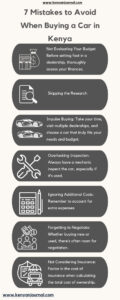As someone who has navigated the bustling streets and the diverse car market of Kenya, I’ve learned that buying a car here is more than just a transaction—it’s a journey.
I remember the first time I set out to purchase a vehicle in Nairobi; the excitement was palpable.
However, it quickly became clear that without proper guidance and preparation, one could easily fall prey to common pitfalls.
Let me share with you the insights and experiences that will help you avoid the mistakes I, and many others, have made.

Whether you’re a first-time buyer or a seasoned negotiator, this article aims to equip you with the knowledge to make an informed and confident car purchase in Kenya.
7 Mistakes to Avoid When Buying a Car in Kenya

1. Not Evaluating Your Budget Before setting foot in a dealership, thoroughly assess your finances.
Determine what you can realistically afford for the vehicle’s price, insurance, and other associated costs.
Avoid relying solely on the dealership’s financing options, which may not align with your budget.
2. Skipping the Research
A staggering 83% of people research online before purchasing a car.
Utilize resources like KBB.com and CarFax.com to understand the vehicle’s value, history, and consumer reviews.
Skipping this step can lead to uninformed decisions and potential regrets.
3. Impulse Buying
It’s easy to be swayed by a car’s aesthetics or features, but impulse buying can lead to overlooking critical aspects such as the car’s practicality or maintenance costs.
Take your time, visit multiple dealerships, and choose a car that truly fits your needs and budget.
4. Overlooking Inspection
Always have a mechanic inspect the car, especially if it’s used.
They can spot potential issues that could incur additional costs down the line.
Ensure the car’s history is verified through the NTSA TIMS portal to confirm ownership and check for any outstanding financial obligations.
5. Ignoring Additional Costs
Remember to account for extra expenses such as taxes, registration fees, and any immediate repairs or upgrades the car may need.
These can add up and affect your overall budget.
6. Forgetting to Negotiate
Whether buying new or used, there’s often room for negotiation.
Don’t accept the first price offered; instead, use your research to negotiate a fair deal based on the car’s condition and market value.
7. Not Considering Insurance
Comprehensive insurance can offer peace of mind and financial protection against accidents or theft.
Factor in the cost of insurance when calculating the total cost of ownership.
BONUS
What is the process of buying a car in Kenya?
Here’s a simplified step-by-step guide:
- Research and Budget: Determine your car preferences, features, and budget.
- Search for Cars: Explore online listings or visit dealerships for new cars, or individual sellers for used ones.
- Verify Ownership: Use the NTSA TIMS portal to check ownership and outstanding financial obligations.
- Inspect the Car: Have a mechanic inspect the car thoroughly for its condition.
- Negotiate and Agree: Reach a final price agreement with the seller.
- Prepare Documents: Gather necessary documents like your National ID/Passport, KRA PIN, and a Banker’s Cheque (avoid cash transactions).
- Transfer Ownership: Complete the ownership transfer process on the NTSA TIMS portal, and make/receive payments.
- Complete Registration: Pay the required taxes and fees, then register the car in your name at the NTSA.
What to do when buying a second-hand car in Kenya?
Consider these additional factors when purchasing a used car:
- Exercise caution: Validate the seller’s credibility and the vehicle’s history through the NTSA TIMS portal search.
- Avoid cash transactions: Opt for a Banker’s Cheque for enhanced security.
- Arrange a pre-purchase inspection: A certified mechanic can uncover potential issues and assess the car’s condition, helping you anticipate repair costs.
- Stay wary of overly enticing deals: If a price appears too good to be true, exercise skepticism.
- Evaluate comprehensive insurance options: Explore coverage to safeguard against accidents or unexpected challenges.
Which car can I buy with under 1.5 million in Kenya?
In Kenya, with a budget of under 1.5 million Kenyan Shillings, you have several good options for cars.
Here are some popular choices:
- Mazda Demio: Ranges from Sh700K to Sh1.2 million.
- Toyota Vitz: Costs between Sh650K to Sh1.2 million and is known for its fuel efficiency.
- Honda Fit: Available from Sh850K up to Sh1.45 million.
- Toyota Axio: Can be bought for around KSh 1.3 million.
- Nissan NV200: Priced at Sh1.5 million.
Wrapping up
By following this guide, you can ensure a smoother car-buying experience and make a purchase that you’ll be satisfied with for years to come.
Remember, the key to a successful car purchase is patience, research, and a clear understanding of your needs and financial capacity.
Happy car hunting.
ALSO READ:
